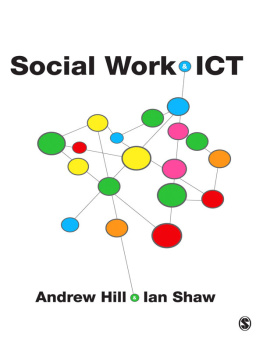Information Management in Social Services
Information Management in Social Services
Edited by
Andrew Kerslake
Nick Gould
First published 1996 by Ashgate Publishing
Reissued 2018 by Routledge
2 Park Square, Milton Park, Abingdon, Oxon, OX14 4RN
711 Third Avenue, New York, NY 10017, USA
Routledge is an imprint of the Taylor & Francis Group, an informa business
Copyright Andrew Kerslake and Nick Gould 1996
All rights reserved. No part of this book may be reprinted or reproduced or utilised in any form or by any electronic, mechanical, or other means, now known or hereafter invented, including photocopying and recording, or in any information storage or retrieval system, without permission in writing from the publishers.
Notice:
Product or corporate names may be trademarks or registered trademarks, and are used only for identification and explanation without intent to infringe.
Publisher's Note
The publisher has gone to great lengths to ensure the quality of this reprint but points out that some imperfections in the original copies may be apparent.
Disclaimer
The publisher has made every effort to trace copyright holders and welcomes correspondence from those they have been unable to contact.
ISBN 13: 978-1-138-32647-7 (hbk)
ISBN 13: 978-0-429-44984-0 (ebk)
Terry Bamford has been Executive Director of Housing and Social Services in Kensington and Chelsea since 1990. He was Director of Social Services, Southern Health and Social Services Board, Northern Ireland, between 1985 and 1990. A former Chair of the British Association of Social Workers he has written two books and numerous articles on social work issues. He currently serves as Chairman of the London Drug and Alcohol Purchasers Group and Co-Chairman of SHIL (Single Homeless in London).
Matthew Dieppe is Head of Policy, Planning and Evaluation in Stockport Social Services Division. After graduating in Natural Sciences from Cambridge, he undertook voluntary youth work in the East End of London and Moss Side, Manchester before training as a Probation Officer. Soon after completing this training, he moved into social services, starting as a social worker in Stockport, and has managed most aspects of the work in the Division throughout his 20 years in Stockport prior to his current post.
Linda Fean has been an Analytical Inspector with the Social Services Inspectorate (SSI) of the Department of Health since October 1992, Analytical Inspectors were appointed to bring research expertise to the development of methodologies for SSI inspections. Her background is in social services research and she has qualifications in psychology, social administration and, more recently applied computing. Immediately prior to joining SSI, as Principal Officer (Information and Research) she had responsibility for the development of information strategies and systems in North Tyneside SSD. She is currently the national Lead Inspector for SSI inspections of SSD Information Strategies and Systems (with Reference to Community Care).
Dr Henri Giller is Managing Director of Social Information Systems Ltd and Fellow of the University of Keele. Henri has been Managing Director of SIS for the past 12 years over which time it has become the leading independent consultancy service providing advice and information to social services departments on policy development, strategic planning, monitoring and evaluation and performance review. In addition to commissions from individual social services departments (and allied agencies) SIS has had many commissions from central government (DoH, NHS(E), Home Office) over-viewing aspects of social policy. Henri has produced numerous books and articles in the area of youth justice, child care, care management and community care implementation. He is currently concluding an overview report for the DOH SSI on a survey of 50 children's services plans.
Dr Nick Gould is deputy director of SSRADU and senior lecturer at the University of Bath; he has particular responsibility for the management of research and development activity of the Unit. Nick was perviously director of social work studies at the University. His research and publications cover diverse fields but include professional education, the criminal justice system, social work with children, and information systems for community care. Prior to his academic career, Nick worked in local authority and forensic psychiatric social work.
Jeremy Oppenheim is the Head of Social Services for Children and Families in the London Borough of Barking and Dagenham. He has previously worked for Haringey Social Services and the voluntary sector.
Jean Jeffrey took up the post of Director of Social Services for Buckinghamshire County Council in April 1992. For four years before that she had worked in senior management in Kent Social Services, putting into operation some of the earliest Care Management systems in the country. As Deputy Director in Kent she was also responsible for Information Strategy and for the implementation of programme of a major system. On behalf of the Association of Directors of Social Services, Jean acts as spokesperson on IT, also on Housing matters. She chairs the ADSS Information Management Group which has a national role in strategic evaluation of IT developments and ideas-sharing. Jean is a board member of the Foundation for Information Technology in Local Government (FITLOG). She is a qualified Social Worker and graduated from the Open University in Social Sciences and Technology, subsequently taking an MA in Management at Leicester.
Andrew Kerslake is the Director of SSRADU (Social Services Research and Development Unit) and a senior lecturer at the University of Bath. SSRADU has been at the forefront of pioneering the use of information technology by SSDs and counts over three quarters of the SSDs in Britain amongst its customer base. Andrew has been actively engaged in developing the Unit's consultancy portfolio on information management. He has a practitioner background in child care and intermediate treatment and prior to developing SSRADU lectured on the social work education programmes at the University of Bath.
Greg Phillpotts has been Chief Statistician at the Department of Health responsible for the Department's Information Strategy for Personal Social Services since 1991. Immediately before that he was responsible for statistical aspects of the Department's Information Management Technology and Technology Strategy for the NHS and the information requirements of the then NHS Management Executive. Earlier in his career he had a series of policy, computing and statistical posts in the Home Office.
Ian Sparks was born and brought up in Liverpool. He trained as a social worker in 1970 and completed an MA in Social Policy in 1980. He worked with young people on Merseyside and then as a voluntary sector manager with Barnardo's and The Children's Society. He was appointed Chief Executive of The Children's Society in 1986. He is married with one daughter. His wife is a Parish Administrator and his daughter is a social policy officer in the voluntary sector.
We are grateful to Linda Brownlow for her patient assistance in preparing the manuscript of this book.
Dr Nick Gould
The publication of this volume marks a rite of passage for social services informatics in the words of the World Health Organisation, 'the combination of technology and methodology which makes possible the computer-assisted collection, storage, processing, retrieval, distribution and management of information' (WHO, 1988, p.3). Some of us who were around twenty years ago during the formative years of Social Services Departments believed we had stoked up the white heat of the technological revolution when we started using carbon-copied, two-way memoranda. The intervening years have seen the emergence and recognition of information as a resource in its own right, with most departments possessing or moving towards an information strategy. Similarly, departments will invariably have made some investment in information technology, whether it be to automate administrative procedures, create electronic client information systems or develop computer-based decision-support systems. What has been experienced in the statutory social services has been paralleled elsewhere in the human services arena, be it the large voluntary organisations, the criminal justice system or the commercial care sector.









